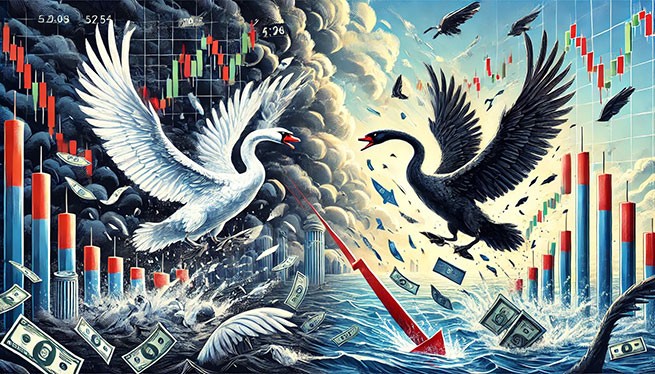The recession is here and global markets are closing lower. This article looks at the US economic woes, misleading employment data, geopolitical tensions and their impact on the global economy.
The recession that was in the air has finally happened. On Friday, global markets closed with a significant drop. Economic data released last week pointed to problems in economies around the world. Particularly alarming were the labor statistics in the United States, which are traditionally subject to falsification and show positive dynamics despite real job losses. Over the past couple of years, a huge imbalance has accumulated that needs to be addressed.
Unemployment in the United States rose to 4.3% in July. On August 2, the Federal Bureau of Statistics of the U.S. Department of Labor published its monthly report on employment and unemployment in the country. In July, the unemployment rate in the United States reached 4.3% against 4.1% in June. Analysts expected that unemployment would remain at the level of the previous month. In July, 114 thousand new jobs were created in the United States – significantly less than in June (179 thousand) and than expected most analysts (about 175 thousand).
Khazin's fund reviews wrote back in March that labor statistics in the US were heavily distorted for the better. Employees of the Philadelphia Reserve Bank (that is, Powell's subordinates, albeit not directly) accused the Bureau of Labor Statistics of distorting data and adding between 800,000 and 1,300,000 jobs.

Source zerohedge.com
As was shown then, after the two series had been tracking each other tick-to-tick for years, a large gap opened up in March 2022 that quickly grew to 1.5 million jobs in just 3 months and which has since grown to a massive 5 million “employed workers” that obviously don't exist.

Source zerohedge.com
And while some of this discrepancy can be explained by the record surge in the number of people holding multiple jobs, which has increased by 1 million since March 2022 to reach a record 8.6 million at the end of 2023 (recall that the Establishment Survey counts 1 worker holding 2 or 3 (or more) multiple jobs as 2 or 3 (or more) separate jobs, even if it is just one worker trying to make ends meet in the roaring inflation of baidenomics), much of the gap remains unexplained.
In 24 hours, positions worth $1.03 billion were liquidated: long – $892.28 million and short – $135.46 million (on the cryptocurrency market). The last time this happened was on March 6 and 15, respectively, when $822 and $811 million were liquidated, respectively.
Geopolitical events and their impact on markets
The best way to solve the accumulated problems is to wait for or create an event that can collapse the market. In this situation, such an event could be the tense relations between Israel and Iran. Usually, wars start suddenly, and no one announces the exact date of the beginning of hostilities. This creates additional tension and unpredictability in the markets.
It is interesting that against the backdrop of all these events, an American delegation flew to Iran via Turkey for talks. This is surprising, given that Iran has been under American sanctions for many years and has promised to hit. Secretary of State Antony Blinken even said when Iran would hit, which speaks of the agreements reached.
The current situation resembles a storm. When the S&P 500 index falls by 12 basis points, it is called a correction, but a fall in the Nikkei index is different. In an election year, America cannot afford to show weakness. Therefore, the current crisis cannot be called a “black swan”, an unexpected and catastrophic event.
The US Federal Reserve (Fed) is not going to change the rate after its last meeting on Wednesday. If money printing does start, decisions will be made closer to the end of the month. It is clear that current events require a careful approach to economic policy.
Against the backdrop of all these events, one can see the disagreements between the two financial giants, America and Great Britain, over little Israel. London, in alliance with China, is trying to prevent America from leaving Ukraine, while America is forced to negotiate with Iran and is trying to establish peace in the Middle East. China also has its own interests in Southeast Asia, which creates additional points of tension, since America is also interested in this region.
Author's opinion: It just so happens historically that the news agenda appears after the event. Let's look at the 2008 crisis. Only after the mortgage bubble burst did we, ordinary people, find out what was happening/happened. It is not the case that news outlets prevent anything. They create the pace, the news background and emotions. Now these emotions are aimed at getting as many people as possible to start selling their assets.
Only some very specialized publications said that the market is overheated and unemployment data does not correspond to reality, as well as data on GDP growth in many countries. Alas, such publications are quite boring, without pictures and they talk about some basis points and percentages.
This should not be taken as financial advice to buy or sell – you do that yourself. We are now considering the mechanism of “pressure”. It so happens that they cannot physically take away your positions, but they can do it through psychology. Look what we have now, even before the meeting the markets started to sag. A few weeks before that they were growing.

Source: yahoo finance
The S&P500 is down 7.2% from its peak in the last 5 days (I count the peak on Aug 1st as the bottom on Aug 5th). Globally, we've seen markets grow by leaps and bounds (the AI sector has been the leader in this). A 12.5% drop in the Nikkei market, if you judge through the prism of the creep, then this is a normal Monday. There is no growth without a fall/correction, as well as a fall without a rebound. There's still more to come…







More Stories
The New York Times shared details of the pager operation
Murder suspect Farion asks to be left alone "behind bars"
Ukrainian Diaspora Abroad